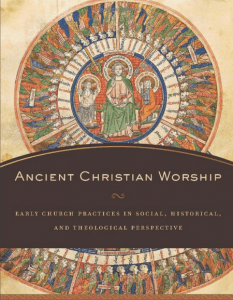 Here’s a question at the front of any genuine understanding of the Christian life, but I suspect some will ask how an answer to this question can help us understand the Christian life. The question? This: What does (your) baptism mean for your life? One of the ironies of church life is that those who are most known for baptism (I’m speaking of Baptists) seem to talk about it the least. That is, baptism is something that happened in the past but has very little to do with the Christian life daily. It is more or less a conversion act and not a daily act. The corresponding irony is that those who are completely unaware of their baptism, namely, those who were baptized as babies — we’re talking here about Presbyterians, Methodists, Anglicans, Lutherans — often speak about learning to live out their baptism daily.
Here’s a question at the front of any genuine understanding of the Christian life, but I suspect some will ask how an answer to this question can help us understand the Christian life. The question? This: What does (your) baptism mean for your life? One of the ironies of church life is that those who are most known for baptism (I’m speaking of Baptists) seem to talk about it the least. That is, baptism is something that happened in the past but has very little to do with the Christian life daily. It is more or less a conversion act and not a daily act. The corresponding irony is that those who are completely unaware of their baptism, namely, those who were baptized as babies — we’re talking here about Presbyterians, Methodists, Anglicans, Lutherans — often speak about learning to live out their baptism daily.
(If I am guilty here of thinking Baptists speak rarely, if ever, of daily living out their baptism but they actually do think and speak this way, then I plead guilty. But I’ve never heard a Baptist speak about living out their baptism daily. I’ve heard lots of Methodists, Presbyterians, Anglicans and not a few Lut’rans.) Out of respect, I include an image of both infant and adult baptism.
What does it mean to live out one’s baptism? To indwell one’s baptism? Calling Rowan Williams, Being Christian: Baptism, Bible, Eucharist, Prayer. This is a simple, not simplistic (Williams is never simplistic), sketch of these four themes. His baptism essay is worth a good quiet read.
 After a sketch of entering into the waters of chaos, and connecting that to our identification with our own sinfulness and more especially the depths of sinfulness, chaos, injustice all around us, Williams contends — rightly — that in baptism we identify with Christ. Many of us teach this, that we identify with Christ in his death and resurrection and we appeal to Romans 6. But we might be tempted to connect this kind of identification only to salvation, but Williams suggests we enter into a kind of incarnational ministry: of going into the world, missionally speaking, to identify with others as Christ has done. I don’t see how this can be anything but sound theology.
After a sketch of entering into the waters of chaos, and connecting that to our identification with our own sinfulness and more especially the depths of sinfulness, chaos, injustice all around us, Williams contends — rightly — that in baptism we identify with Christ. Many of us teach this, that we identify with Christ in his death and resurrection and we appeal to Romans 6. But we might be tempted to connect this kind of identification only to salvation, but Williams suggests we enter into a kind of incarnational ministry: of going into the world, missionally speaking, to identify with others as Christ has done. I don’t see how this can be anything but sound theology.
But Rowan Williams presses us to think more about our identification with Christ, and I found this stimulating. In many forms of Christian theology, and I think this is special to the Reformers, Christ is seen in three “offices”: prophet, priest and king.
In baptism we identify with those three offices and we are marked by those three offices, so that we become prophetic, priestly and royal. How so?
1. Our prophetic identity means we remind ourselves and one another of our essential truth and identity. Too often the prophetic is taken to be about taking loud and clear stands about matters, but he suggests it is more about knowing who we are and how we are to live as God’s people.
2. Our priestly identity means we are to mend relationships between God and others and between ourselves and others and between others and others. It is about building bridges. Not sure I agree here: I see the priestly ministry as one of mediating between others and God — the priest represented the people to God, interceded for others to God. We are all priests in this sense. So this is our prayer and intercessory identity.
3. No surprise here: our royal identity is about administering and striving for justice and peace and freedom.
To indwell our baptism means to identify with Christ and to be identified with what Christ does: he speaks the truth of God to us, he mediates between us and God, and he rules in the way of God.











